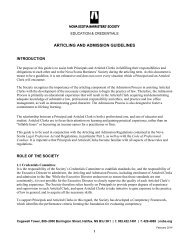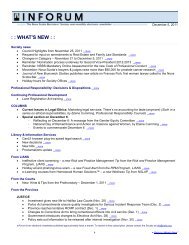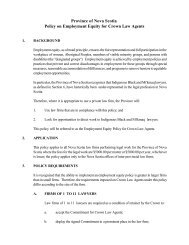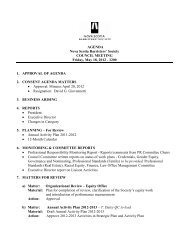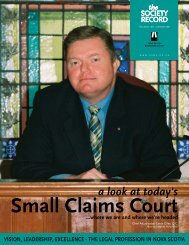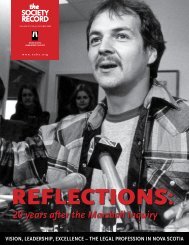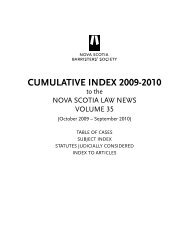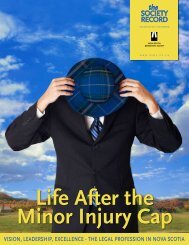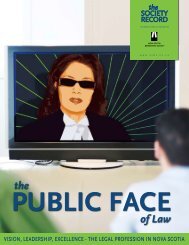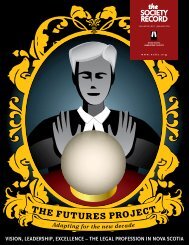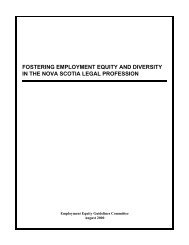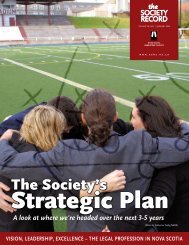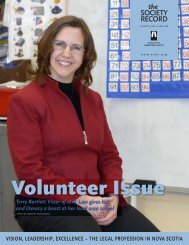SR Vol 27 No 3, July 2009 - Nova Scotia Barristers' Society
SR Vol 27 No 3, July 2009 - Nova Scotia Barristers' Society
SR Vol 27 No 3, July 2009 - Nova Scotia Barristers' Society
You also want an ePaper? Increase the reach of your titles
YUMPU automatically turns print PDFs into web optimized ePapers that Google loves.
BRIEFS<br />
Steeves’ ensuing critical examination illustrates Halifax’s response<br />
to crime during a period of social and economic upheaval,<br />
highlighting issues surrounding “the distorted portrayal of<br />
African-Canadian criminality,” he says. It’s also the first research<br />
to examine significant changes in the practice of jury challenges<br />
in Canada during the early 20 th century. But more specifically, it<br />
reveals “a very troubling practice in jury selection that affected<br />
most, if not all, jury trials of African-<strong>No</strong>va <strong>Scotia</strong>ns in Halifax,<br />
well into the middle of the century,” he says.<br />
The historical issues are worthy of reflection today, by lawyers<br />
generally and criminal law practitioners in particular.<br />
“Legal history not only examines what the law was but it helps<br />
us understand how and why the law has changed over time,”<br />
says Steeves.<br />
The <strong>Society</strong>’s Race Relations Committee (RRC) agreed – selecting<br />
Steeves for his submission, titled “Maniacal Murderer or Death<br />
Dealing Car: The Case of Daniel Perry Sampson 1933-1935.” It<br />
will appear in the first collection of essays on African-Canadians<br />
and the law, to be published in 2010 by the Osgoode <strong>Society</strong> for<br />
Canadian Legal History.<br />
“I’m glad that more people will hopefully be able to learn about<br />
the case when it appears,” says Steeves, who is “honoured” by<br />
the award and extends special thanks to Clarke (U of T) and<br />
Professors Blake Brown (SMU) and Philip Girard (Dal), “for their<br />
generous comments during the composition of the paper.”<br />
John Rogers QC, Stewart McKelvey, presents the new award to Professor<br />
Michelle Williams-Lorde, who accepted on behalf of David Steeves.<br />
The 33-year-old lawyer, a member of the Bar in both <strong>No</strong>va <strong>Scotia</strong><br />
and Alberta, recently moved to Toronto and is developing further<br />
work for publication. He graduated from Dalhousie in May with a<br />
Master of Laws degree. He also holds a Bachelor of Laws degree<br />
from Dal and a Bachelor of Arts degree in English literature and<br />
history from Mount Allison University.<br />
Essays with impact<br />
The new Race and the Law Paper Prize was created<br />
to recognize and encourage outstanding scholarship focusing<br />
on issues of race and law, says Bedford lawyer Barbara Darby.<br />
“We’re delighted that this new initiative provides students with<br />
an opportunity to have their work read by members of the <strong>No</strong>va<br />
<strong>Scotia</strong> Bar,” says Darby, extending thanks on behalf of the RRC’s<br />
paper prize subcommittee to all students who submitted work<br />
for consideration.<br />
“During our evaluation process, the committee members were<br />
most impressed by the calibre and quality of the papers. Each<br />
one offered readers an opportunity to learn something new.”<br />
David Steeves’ essay was a fitting choice for the first annual<br />
award, she adds: “His account of an important moment in <strong>No</strong>va<br />
<strong>Scotia</strong>n legal and social history—one likely unfamiliar to most<br />
readers—was both educational and frankly, quite gripping!”<br />
For his part, Steeves is hopeful that the winning papers will be<br />
circulated widely to generate further education and discussion.<br />
“Students at Dalhousie Law School have been doing important<br />
work on issues relating to race and the law for many years, and<br />
will certainly continue to do so,” he says.<br />
“What this award will do, I hope, is challenge students who<br />
normally might not be interested in this area of scholarship to<br />
consider how issues of race have impacted, and continue to<br />
impact, the practice and study of law. This may result in more<br />
papers being written but, more importantly, it will open up a<br />
wider conversation about race among students at the law school,<br />
the Bar, the Bench and the public.”<br />
<strong>July</strong> <strong>2009</strong> 11



